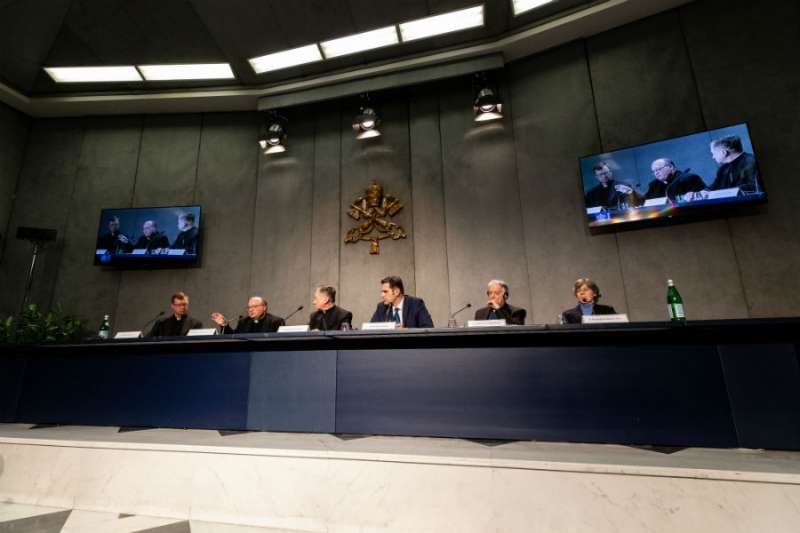The Vatican has continued to downplay expectations ahead of a summit meeting of bishops in Rome to discuss the ongoing sexual abuse crisis, noting that practical steps in handling abuse will come from subsequent meetings held in Rome and not the three-day session itself.
During a press briefing Wednesday, Alessandro Gisotti, interim director of the Holy See Press Office, reported that a recent meeting of the pope’s C9 Council of Cardinals had listened to a presentation by Fr. Federico Lombardi, SJ regarding the summit.
Lombardi is serving as moderator of the three-day conference on sexual abuse, scheduled to begin Feb. 21.
According to Gisotti, the pope’s senior advisory committee heard from Lombardi that the meeting’s top priority is to underscore the need for the Church to be a “safe place” for minors, and to emphasize the gravity of sexual abuse to bishops from around the world.
Gisotti told the press that after the three-day summit concluded, subsequent meetings would be key to advancing practical reforms, including a meeting between the heads of relevant curial departments and the summit organizing committee members on Feb. 25.
One member of the C9, which is actually down to six members following recent changes by Pope Francis, is Cardinal Séan O’Malley of Boston, head of the Pontifical Commission for the Protection of Minors. Gisotti told the Feb. 20 press conference that O’Malley had emphasized to the papal advisors that follow-up to this week’s meeting “will be very significant.”
Although he is widely perceived as among the Church’s most experienced and credible reformers on the issue of sexual abuse, O’Malley was not asked to join the organizing committee or the list of speakers for the summit, which will be attended by the heads of the world’s bishops’ conferences.
According Gisotti, O’Malley reportedly stressed in the C9 meeting that an April meeting of the papal commission he heads will be an important opportunity to gauge progress on the summit’s follow-up agenda.
At a Feb. 18 press conference with the organizing committee members, including Cardinal Blase Cupich of Chicago, Maltese Archbishop and CDF adjunct secretary Charles Scicluna, and Fr. Hans Zollner, SJ, similar points were made about the limited focus and expectations for the three day-meeting.
Cupich said Monday that it is important Church leaders “focus on the the task at hand” and not “inflate expectations.”
During the Monday press conference, Gisotti deflected media questions about specific abuse allegations, including one involving Vatican personnel.
“This is not the [occasion] to speak on this case or this other case,” he said, insisting that the purpose of the week’s summit is to address principles, not specifics.
Archbishop Scicluna noted that questions about particular high profile cases, even after the decision to laicize Theodore McCarrick, are “legitimate.”
Responding to questions about Msgr. Joseph Punderson, an official of the Apostolic Signatura - the Vatican’s highest court - Scicluna said that “people need to know that what Rome asks of the local Churches, it is also ready to apply at home.”
Last week, New Jersey media reported that Punderson was named among priests “credibly accused" of sexual abuse of minors in a list released by the Diocese of Trenton. Despite his role at the Apostolic Signatura he was listed by the diocese as “removed from ministry.”
Gisotti told the Monday press conference that Punderson was not at the Signatura “at this moment” but offered no details about whether he had been formally removed from his office.
Asked about his position in Rome, a diocesan spokesperson told CNA on Friday that Punderson is “formerly an official at the Apostolic Signatura.”
According to the diocese, Punderson was asked by Trenton Bishop David O’Connell to resign his position in Rome in November 2018, but the diocese had no other information available.
Advocates for victims of clerical sexual abuse have also gathered in Rome ahead of the Vatican bishops’ summit, with many calling for increased transparency in the handling of individual cases and stricter measures to ensure episcopal accountability.
On Monday, Gisotti emphasized that the three-day meeting is not intended to produce individual policies or answers to particular cases.
“We have to stay focused on the issue - the protection of minors globally. We have always said it is a global problem with a global response.”

